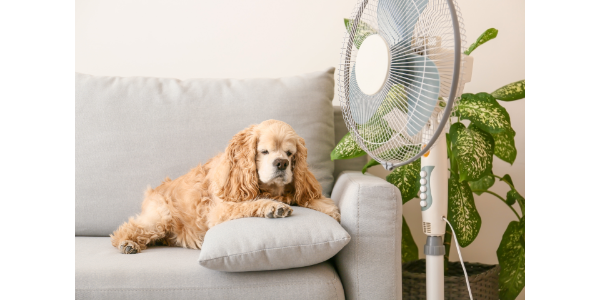There are many common household hazards that can endanger the health of your air conditioner and eventually cause it to slow down, clog up, or even malfunction. Pet hair is likely the most annoying and frequently encountered of these dangers. Even while our furry pets may give us affection and company, their hairy coats don’t always get along well with your house’s heating and cooling systems.
Is this a blog advocating pet removal in order to preserve your air conditioner? Definitely not. We adore our pets, and with the proper care and consideration, your home can run smoothly. It’s crucial to understand how owning a pet will affect your HVAC system and what that implies for you as a homeowner in terms of maintaining it.
Airborne Allergens And Pet Dander

Why are dogs and cats particularly common triggers for allergies? Simple: allergens and other microscopic diseases carried by their hairy coats cause allergic reactions and symptoms like sneezing, coughing, watery eyes, and similar ones. When pets shed their fur, this dander sticks to the individual hairs that float in the air until they are knocked loose by being trodden on, colliding with something, or even being drawn through your HVAC system.
As a result, it’s possible that your HVAC system is pushing pet dander back into your house by moving it around in the air. The dander may pass past your air filter even though the hair itself may get caught there, making your air conditioner or heater a partner in the process of aggravating your allergies.
Airborne Pet Dander Solutions
So what can you do to lessen this issue, maintain your ability to breathe properly, and still enjoy your beloved pet’s company? Actually, your HVAC system might be one of your best allies in this battle. This is so because your home’s HVAC system is one of the biggest air circulators, if not the biggest. This circulator draws air from your house through an intake vent, and after passing it through an air filter, which keeps things like pet hair, dust, and even pet dander from being circulated back in, it returns the air to your home.
However, an air filter that is outdated or clogged restricts the airflow across your heating or cooling coils, adding significant additional stress to your HVAC system. This increases the amount of effort required by your system to maintain the proper temperature in your house, puts more stress on its moving parts, and causes significant system wear and tear. This not only consumes a lot more electricity, but it may also hasten the breakdown and requirement for substantial repairs of your system.
What can you do, then, to lessen this issue? There are two straightforward fixes:
Regularly Vacuum Your House

The amount of pet dander and fur you have floating around in your home can be significantly reduced by just getting out the vacuum cleaner and vacuuming up any hair that may have gotten lodged in your carpet, rugs, window treatments, and other fabric surfaces. Less hair and dander that is free-floating means less of it will get stuck in your air filter and slow down your HVAC system when it operates. It’s a fantastic technique to lessen allergy discomfort as well!
Replace The Air Filter

We see far too many homeowners who don’t pay enough care to their air filter. Sometimes, people would neglect to inspect or even replace the filter for months or even years. By the time the air conditioning technician gets there , the coils are covered in dust and debris that has been drawn through the filter itself, the system is astonishingly inefficient, and a host of other issues have also arisen. The filter has been hammered with so much junk that it is fully clogged.
If you have a pet, you should regularly check your air filter and replace it as needed every three to four months. This may seem like a lot, but keep in mind that changing a filter may extend the life and efficiency of your HVAC system significantly for a relatively small cost and time investment. Just make sure your system is turned off before you do so you don’t run the risk of any dust or pet hair getting into the interior of your indoor unit. New air filters can typically be purchased from your local hardware store for only a few dollars, and most people can perform the replacement without any special tools or training.





GIPHY App Key not set. Please check settings